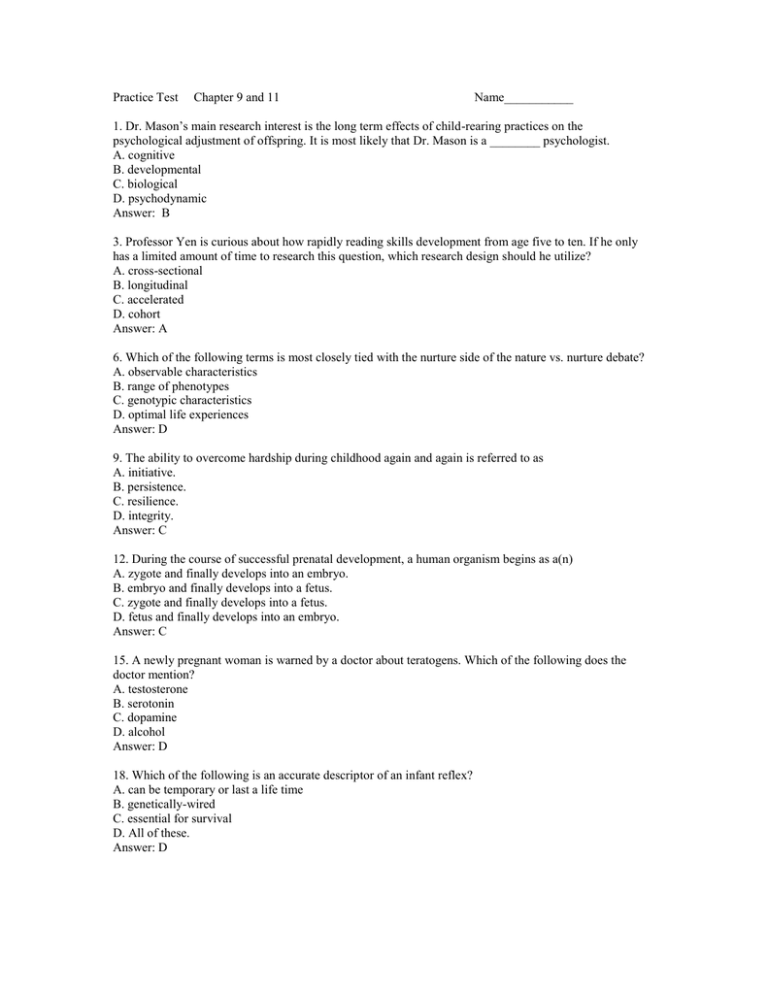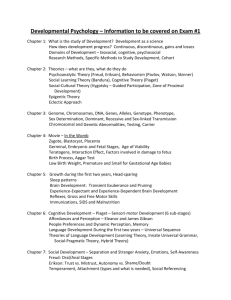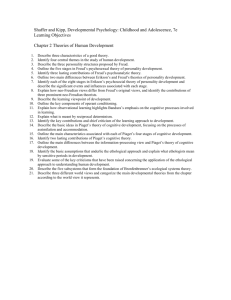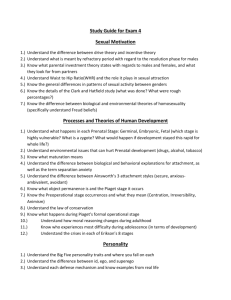
Practice Test
Chapter 9 and 11
Name___________
1. Dr. Mason’s main research interest is the long term effects of child-rearing practices on the
psychological adjustment of offspring. It is most likely that Dr. Mason is a ________ psychologist.
A. cognitive
B. developmental
C. biological
D. psychodynamic
Answer: B
3. Professor Yen is curious about how rapidly reading skills development from age five to ten. If he only
has a limited amount of time to research this question, which research design should he utilize?
A. cross-sectional
B. longitudinal
C. accelerated
D. cohort
Answer: A
6. Which of the following terms is most closely tied with the nurture side of the nature vs. nurture debate?
A. observable characteristics
B. range of phenotypes
C. genotypic characteristics
D. optimal life experiences
Answer: D
9. The ability to overcome hardship during childhood again and again is referred to as
A. initiative.
B. persistence.
C. resilience.
D. integrity.
Answer: C
12. During the course of successful prenatal development, a human organism begins as a(n)
A. zygote and finally develops into an embryo.
B. embryo and finally develops into a fetus.
C. zygote and finally develops into a fetus.
D. fetus and finally develops into an embryo.
Answer: C
15. A newly pregnant woman is warned by a doctor about teratogens. Which of the following does the
doctor mention?
A. testosterone
B. serotonin
C. dopamine
D. alcohol
Answer: D
18. Which of the following is an accurate descriptor of an infant reflex?
A. can be temporary or last a life time
B. genetically-wired
C. essential for survival
D. All of these.
Answer: D
21. What technique in studying infant perception involves looking for a reliable preference for one stimulus
over another?
A. habituation
B. preferential looking
C. object permanence
D. non-differential perception
Answer: B
24. Baby Janice knows that when she is put in the highchair it is time to eat. So when her father puts her in
the highchair and hands her a book, Janice puts the corner of the book in her mouth. Janice is exhibiting
A. schematic thinking.
B. assimilation.
C. accommodation.
D. deferred imitation.
Answer: B
27. Incorporating new information into existing theories is to ________ as modifying existing theories in
light of new information is to ________.
A. conservation; cognition
B. imprinting; maturation
C. sensorimotor activities; preoperational activities
D. assimilation; accommodation
Answer: D
31. "Out of sight, out of mind" can describe the behavior of a child who has not mastered the concept of
A. conservation.
B. separation anxiety.
C. attachment.
D. object permanence.
Answer: D
37. If children cannot grasp the concept of conservation, they are unable to
A. deal with the discipline of toilet training.
B. see things from the point of view of another person.
C. recognize that the quantity of a substance remains the same despite changes in its shape.
D. retain earlier schemas when confronted with new experiences.
Answer: C
42. Between ages 7 and 11, children can think in sophisticated ways as long as what they are thinking about
is tangibly represented. Piaget calls this stage
A. concrete operations.
B. formal operations.
C. preoperational thought.
D. sensorimotor limitations.
Answer: A
48. Adolescents are required to take algebra because cognitive development theory indicates that they are
ready to learn this type of mathematics. Some of Piaget’s critics would respond to this statement by
pointing out that
A. most adolescents have not reached the preoperational stage.
B. Piaget did not examine adolescents’ mathematical development.
C. Piaget overestimated the cognitive abilities of adolescents.
D. Piaget’s cognitive theory focused on the development of very young children.
Answer: C
49. Lev Vygotsky recognized that cognitive development
A. is an interpersonal process.
B. happens in a cultural context.
C. is facilitated by the process of scaffolding.
D. All of these.
Answer: D
54. The work of Harry and Margaret Harlow established that
A. early social experience in humans is essential to normal functioning in adulthood.
B. physical development is influenced more by nurture than it is by nature.
C. contact comfort is more important than feeding in the attachment process.
D. parenting style is reflective of offspring’s physical appearance.
Answer: C
57. Which of the following is NOT one of the major differences between Erikson’s theory and Freud’s
theory?
A. Erikson’s theory is a stage theory, while Freud’s theory is devoid of stages.
B. Freud believed that the personality is formed during early childhood, while Erikson believed that
development continues throughout life.
C. Freud’s theory focused on psychosexual development while Erikson’s theory focused on psychosocial
development.
D. In Freud’s theory, conflicts and their resolution revolve more around early family relationships, while in
Erikson’s theory, they revolve more around relationships with both family and society.
Answer: A
61. All of the following are stages in Erikson’s theory of development EXCEPT
A. trust vs. mistrust.
B. autonomy vs. shame and doubt.
C. initiative vs. guilt.
D. growth vs. regression.
Answer: D
64. Ian came home late for curfew. Without asking for an explanation, his parents sent him to his room and
informed him that he was grounded for a month. What type of parenting did Ian’s parents demonstrate?
A. authoritarian
B. conventional
C. authoritative
D. neglectful
Answer: A
71. Changes in thoughts, feelings, and behaviors regarding principles that guide what people should do is
part of ________ development.
A. metacognitive
B. cognitive
C. temperament
D. moral
Answer: D
75. Which of the following statements best describes moral reasoning at the postconventional level?
A. “What I did was illegal, but it saved somebody’s life.”
B. “What I did was illegal, but nobody will ever find out.”
C. “What I did was illegal, but saving a life is what a good person is expected to do.”
D. “What I did was illegal, but the family of the person I saved offered a huge reward.”
Answer: C
75. Which of the following statements best describes moral reasoning at the postconventional level?
A. “What I did was illegal, but it saved somebody’s life.”
B. “What I did was illegal, but nobody will ever find out.”
C. “What I did was illegal, but saving a life is what a good person is expected to do.”
D. “What I did was illegal, but the family of the person I saved offered a huge reward.”
Answer: C
85. Juliet refuses to go to the dance because she has just developed a pimple on her chin and she is sure
everyone will talk about it behind her back. Her behavior illustrates
A. the basal metabolic rate.
B. the adolescent identity crisis.
C. peer influence.
D. adolescent egocentrism.
Answer: D
90. Identity ________ is a way to describe the status of an individual who is exploring alternative paths but
has not yet made a commitment.
A. diffusion
B. foreclosure
C. moratorium
D. achievement
Answer: C
94. Which of the following biological theories of aging emphasizes the role of telomeres?
A. free-radical
B. cellular clock
C. hormonal stress
D. All of these.
Answer: B
2. According to the text, biological characteristics are referred to as one’s
A. sex.
B. gender.
C. gender identity.
D. sexual orientation.
Answer: A
5. Gina suffered damaged to her gonads. As a result, she may no longer produce
A. androgens.
B. ova.
C. chromosomes.
D. melatonin.
Answer: B
7. Which of the following is NOT an example of a secondary sex characteristic?
A. development of penis
B. facial hair
C. development of breasts
D. pubic hair
Answer: A
11. Pat is very assertive, nurturing, independent, and caring. Pat is best described as
A. instrumental.
B. expressive.
C. androgynous.
D. transgendered.
Answer: C
14. The SRY gene causes one to become
A. male.
B. female.
C. undifferentiated.
D. androgynous.
Answer: A
15. How do female brains differ from male brains?
A. Female brains are larger.
B. Female brains have higher cortical volume.
C. Female brains have more white matter.
D. The female hippocampus is more reactive to stress.
Answer: B
18. The term ________ refers to experiencing one’s psychological gender as being different from one’s
physical sex.
A. androgyny
B. expressiveness
C. gender confusion
D. transgender
Answer: D
27. According to Darwin, Shelly is most likely to go out with Cole if he
A. is good looking.
B. can win his tennis match.
C. is nice.
D. is older than her.
Answer: B
31. Those who adhere to the ________ perspective examine gender development by looking at how
experience influences the formation of a person’s sense of gender.
A. biological
B. social cognitive
C. psychodynamic
D. social role
Answer: B
34. A mental framework for understanding what is considered appropriate behavior for males and females
is called a gender
A. stereotype.
B. role.
C. schema.
D. theme.
Answer: C
42. The difficulty that many divorced fathers experience when trying to gain custody of their children may
be due to
A. sexual scripting.
B. relational aggression.
C. gender stereotyping.
D. non-conforming behavior.
Answer: C
45. The research data on gender differences in intellectual abilities has revealed that
A. girls do poorly on most tasks that require mathematical computations.
B. girls have superior verbal abilities.
C. boys struggle on tasks requiring object manipulation.
D. boys and girls both struggle with visual spatial orientation.
Answer: B
49. Behavior that is meant to harm the social standing of another person is called ________ aggression.
A. conduct
B. overt
C. relational
D. social
Answer: C
52. The ways in which we experience and express ourselves as sexual beings is referred to as our
A. sex.
B. gender.
C. sexuality.
D. sexual orientation.
Answer: C
55. A homosexual man who is watching two lesbian women engage in sexual activity is likely to
A. become aroused.
B. begin masturbating.
C. be disinterested.
D. be disgusted.
Answer: C
63. The occurrence of homosexuality ranges from ________ percent of the population.
A. 1 to 5
B. 2 to 10
C. 5 to 12
D. 9 to 15
Answer: B
66. Research on the influence of genes on sexual behavior has revealed that genes
A. determine sexual behavior.
B. play a role in determining sexual behavior.
C. are as strong an influence as they are for other characteristics like intelligence.
D. impact psychological characteristics just as directly as they impact physical characteristics.
Answer: B
69. The 2D:4D ratio refers to
A. brain size.
B. finger length.
C. testosterone levels.
D. hemispheric symmetry.
Answer: B
72. The vast majority of “tomboys” turn out to be
A. bisexual.
B. homosexual.
C. heterosexual.
D. cross-gendered.
Answer: C
74. In terms of conflict, gay and lesbian couples are likely to
A. argue more than heterosexual couples.
B. avoid it because they understand the pain associated with conflict.
C. manage it because of their positive attitudes.
D. model their heterosexual parents.
Answer: C
78. Early data collected by Kinsey regarding sexual behavior indicated that ________ percent of married
men had been unfaithful.
A. 75
B. 50
C. 16
D. 7
Answer: B
84. Jack and Jill have been kissing on the couch for several minutes. Jack feels his penis begin to enlarge.
He is experiencing the ________ phase of the sexual response pattern.
A. orgasm
B. plateau
C. excitement
D. resolution
Answer: C
90. Patterns for how people should behave sexually are called
A. sexual scripts.
B. gender schemas.
C. sexual protocols.
D. sexual patterns.
Answer: A
93. Abstinence-only sex education promotes the
A. safe use of condoms.
B. safe use of oral contraceptives.
C. practice of no sex outside of marriage.
D. All of these.
Answer: C






